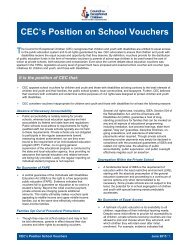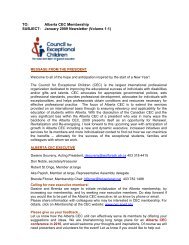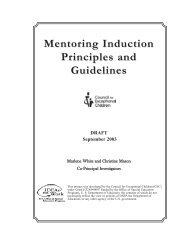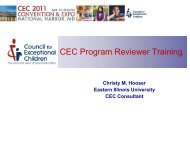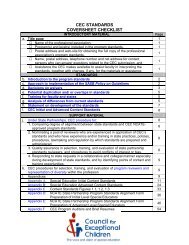What Every Must Know Special Educator - Council for Exceptional ...
What Every Must Know Special Educator - Council for Exceptional ...
What Every Must Know Special Educator - Council for Exceptional ...
You also want an ePaper? Increase the reach of your titles
YUMPU automatically turns print PDFs into web optimized ePapers that Google loves.
submitted assuring that the graduates of the program<br />
possess appropriate knowledge, skill, and dispositions<br />
to practice within the respective professional role<br />
safely and effectively.<br />
Colleagues review the per<strong>for</strong>mance of the program<br />
assessment results to determine how well the program<br />
has prepared their prospective teachers in alignment<br />
with CEC national professional standards. Only<br />
when a special education preparation program has<br />
CEC national recognition is the public assured that<br />
program graduates are prepared to practice safely and<br />
effectively.<br />
For individuals looking <strong>for</strong> a preparation program,<br />
it is important <strong>for</strong> them to assure that the program is<br />
nationally recognized by CEC. For over 27 years, CEC<br />
alone and in partnership with NCATE has provided<br />
recognition to quality special education preparation<br />
programs.<br />
Through the CEC partnership with NCATE, CEC has<br />
agreements with 50 states or territories in the United<br />
States. To date CEC has evaluated and approved approximately<br />
one third of all special education preparation<br />
programs in the United States.<br />
Additionally, CEC maintains procedures to conduct<br />
per<strong>for</strong>mance-based program reviews outside the<br />
United States and in those instances in which a preparation<br />
program does not seek national accreditation<br />
through NCATE (Appendix 7).<br />
Alternative Preparation Programs<br />
Currently it is estimated that almost a million individuals<br />
with exceptional learning needs receive their<br />
special education services from approximately 50,000<br />
individuals who are not even minimally qualified under<br />
licensing standards to practice special education.<br />
Many other children receive special education services<br />
from teachers doing double duty because over 3,000<br />
Historically, the licensing of individuals to practice<br />
has been the responsibility of states and provinces.<br />
Although approaches to licensing special educators<br />
taken by jurisdictions have been variable and somewhat<br />
idiosyncratic, most states today base their licensing<br />
process on the standards of the national societies<br />
representing the various disciplines within education.<br />
Currently, over 40 states are committed to align their<br />
licensing processes with the CEC standards. As mentioned<br />
previously, most individuals are now licensed<br />
<strong>for</strong> multicategorical practice. Many states use terms<br />
assuring high-QualiTy liCensure<br />
special education teaching positions remain vacant<br />
each year or school districts have assigned them unreasonably<br />
large caseloads. This crisis in demand <strong>for</strong><br />
special education teachers is fueling a good deal of<br />
interest in alternative ways to prepare special educators.<br />
Many of these alternatives hold promise, and<br />
CEC actively embraces innovative approaches preparing<br />
well-qualified special educators. However, some<br />
poorly conceptualized alternative approaches appear<br />
to have sacrificed standards in attempting to place<br />
unprepared individuals in poorly supported teaching<br />
positions. The result has been an expensive revolving<br />
door through which ill-prepared individuals are<br />
rushed into classrooms only to become overwhelmed<br />
and disillusioned. These individuals leave special<br />
education in large numbers. Most significant, a large<br />
price is extracted from the learning of individuals with<br />
exceptional learning needs.<br />
Alternative preparation programs have historically<br />
played and can continue to play a positive role<br />
in addressing the demand deficit in special education.<br />
However, decision makers must not be seduced by<br />
“quick fixes.” School districts cannot af<strong>for</strong>d to waste<br />
precious dollars on recruitment and induction of<br />
unprepared individuals. Most important, too many<br />
individuals with exceptional learning needs will<br />
never benefit from the promise of the Individuals With<br />
Disabilities Education Act (IDEA) unless decision makers<br />
embrace solutions that address both quantity and<br />
quality in teacher preparation. Regardless of whether<br />
a preparation program is traditional or alternative,<br />
campus-based or school-based, distance or face-toface,<br />
CEC expects all programs preparing special<br />
educators to meet CEC nationally validated standards<br />
by undergoing a per<strong>for</strong>mance-based review. As stated<br />
in the introduction, this approach provides the most<br />
reasonable assurance to the parents and the public that<br />
beginning special education teachers are prepared <strong>for</strong><br />
their professional responsibilities.<br />
such as Teaching of Individuals With Mild/Moderate<br />
<strong>Exceptional</strong>ities and Teaching of Individuals With<br />
Severe/Profound <strong>Exceptional</strong>ities to describe these<br />
multicategorical licenses. According to the latest figures<br />
from the U.S. Department of Education, over 90%<br />
of the titles of the special education degrees granted<br />
each year are multicategorical (U.S. Department of<br />
Education, 2003). For those states that use a multicategorical<br />
approach, CEC has developed the Curriculum<br />
Referenced Licensing and Program Accreditation<br />
Framework. The Individualized General Education<br />
Curriculum and Individualized Independence<br />
SECtion : prEparing to bECoME a SpECial EduCation profESSional 1




